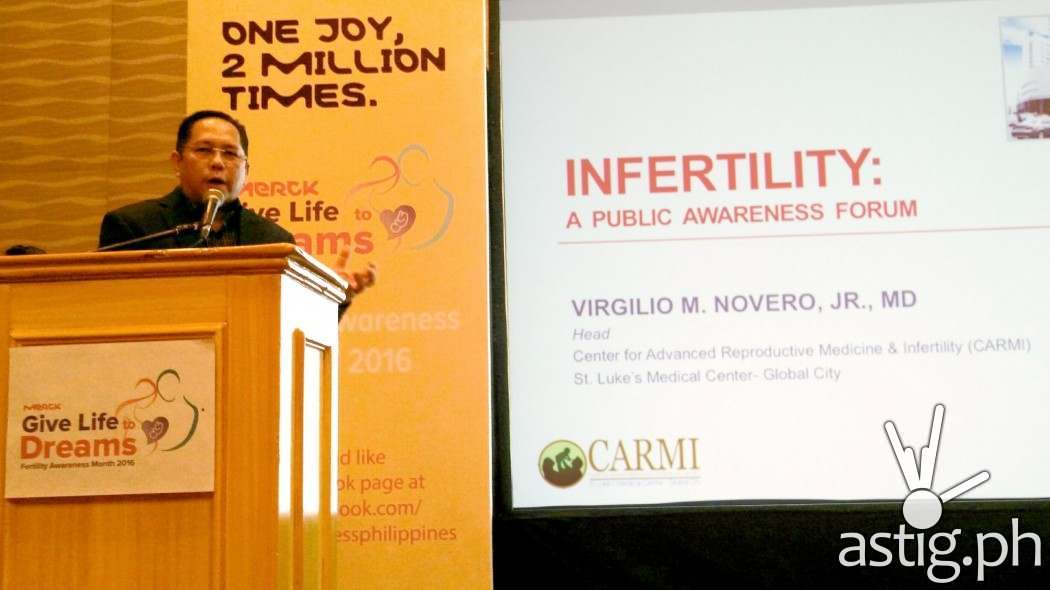For some Filipino couples, the dream of having and raising a baby is dashed by infertility, which, unknown to many, is considered a disease by the World Health Organization (WHO).
Dr. Virgilio Novero, head of the Center for Advanced Reproductive Medicine & Infertility (CARMI), St. Luke’s Medical Center – Global City discusses modern and effective ways to address infertility at Merck’s Fertility Awareness 2016 media forum, “Give Life to Dreams.”
WHO describes infertility as “a disease of the reproductive system defined by the failure to achieve a clinical pregnancy after 12 months or more of regular unprotected sexual intercourse.”
To help couples fulfill their dream, Merck Philippines, the local arm of the world’s oldest pharmaceutical and chemical company, has joined forces with St. Luke’s Medical Center – Global City for a public information project that promotes awareness on infertility and the different medical solutions available. This project coincides with the fifth year of St. Luke’s flagship Center for Advanced Reproductive Medicine and Infertility (CARMI).
Extent of infertility
“Based on a Synovate survey we conducted in 2011, one out of 10 Filipinos is suffering from infertility,” said CARMI head Dr. Virgilio M. Novero Jr. “This condition is related to our socio-cultural practices, including the marrying age, educational status, and professional goals.”
Aside from socio-cultural factors mentioned by Novero, a couple’s fertility can also be affected by issues in the female and male reproductive systems, as well as various medical conditions that can affect the quality of the egg and sperm cells.
“Instead of just giving up their dream of having a child, there are modern and effective ways to address infertility,” Novero explained. “A couple can come in for a series of basic and ancillary tests to determine the root cause of their fertility issues, and we can help develop a treatment plan that will deliver their desired result – pregnancy.”
Solutions
One of the medical solutions that childless Filipino couples can explore is Assisted Reproductive Technology (ART), which is an umbrella term that refers to in-vitro fertilization (IVF) and its variants. This special fertility treatment procedure stimulates multiple ovarian follicles and facilitates egg cell retrieval.
During the course of treatment, embryos will be formed outside of the female patient’s body. Once the “cultures” have formed successfully, they will be transferred to the patient’s uterus.
ART is recommended for patients suffering from blocked fallopian tubes, severe sperm deficits, unexplained infertility, mild endometriosis, and ovulation disorders, among others.
Big improvement
Though not unheard of by Filipinos, IVF is often seen as risky, needlessly expensive, only for those who can get the procedure done abroad, and, worse, ineffective. Novero explained that ART has improved significantly over the years.
“In the past, doctors can only recommend IVF to a select few. In recent years, technological advances, including new knowledge in hormonal treatment, improvement in video technology, and other medical equipment, have boosted IVF’s efficiency,” Novero revealed.
“With the help of Filipino doctors and specialty groups, Merck has been able to propagate more information on infertility,” said Dess Cartaño, senior product manager for fertility, Merck Philippines. “At this point, we want to provide fertility-challenged couples with actual, effective, and efficient solutions that will give life to their dreams of a family once more.”
To know more about infertility and IVF in the Philippines, Merck Philippines will be holding a seminar on the science and possibilities of IVF on September 24, 2016 from 4 – 7 p.m. at the Crowne Plaza Manila Galleria in Quezon City. The forum is open to patients and admission is free.

